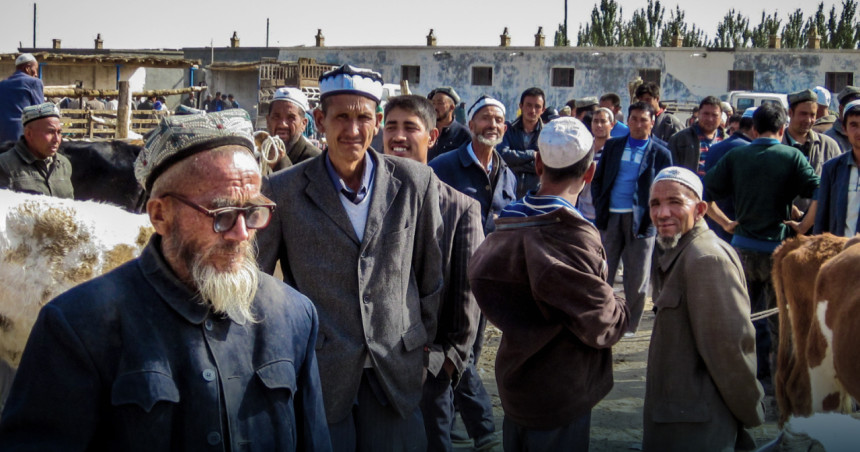A report released by Human Rights Watch (HRW) has documented hundreds of Uyghur villages whose names have been sinicised in the past thirteen years in a pathetic attempt to wipe out Uyghur culture. [1]
It has been revealed that, between 2009 and 2023, at least 630 villages were renamed, with the most common replacements being Harmony, Unity, and Happiness — some of which reek of forced assimilation undertones. [1]
The report goes on to state that the renaming drive has had a major impact on Uyghur natives, with some leaving concentration camps only to be lost as they cannot locate their village by its true name.
“Because of a lack of access to Xinjiang, the full impact of the village name changes on people’s lives is unclear.
“Uyghur Hjelp interviewed 11 Uyghurs who lived in villages whose names had been changed, and found that the experience had a deep impact on them.
“One villager faced difficulties going home after being released from a re-education camp because the ticketing system no longer included the name she knew. She later faced more difficulties registering for government services due to the change.
“Another villager said he wrote a poem and commissioned a song to commemorate all the lost locations around where he had lived.” [1]
HRW Acting China Director Maya Wang said of the findings from its mid-June report,
“The Chinese authorities have been changing hundreds of village names in Xinjiang from those rich in meaning for Uyghurs to those that reflect government propaganda.
“These name changes appear part of Chinese government efforts to erase the cultural and religious expressions of Uyghurs.” [1]
The vital research, which was collaboratively gathered with the support of Norway-based Uyghur Hjelp, continues to expose the Chinese occupying regime in East Turkestan, as it seeks to completely wipe out the Uyghurs through Sinicisation.
Steady efforts aimed at erasing Uyghur heritage
Between 2009 and 2023, it is understood that 3,600 of the 25,000 villages in East Turkestan had their names altered, either in an administrative fashion (changing numbers around) or corrected (apparently due to being misspelt).
However, just under one-fifth of the 3,600 have involved the removal of historical, cultural, or religious references to the Uyghur people.
It might be argued that the government has masked this particular strand in its efforts to ethnically cleanse the Uyghurs by engaging in the seemingly harmless task of revising signage. However, it cannot be understated: China is occupying Uyghur land and continuing to act with impunity.
Operation Strike Hard painted Uyghurs as “terrorists”
In May 2014, the Chinese regime launched its so-called Operation Strike Hard Campaign Against Violent Terrorism. [2]
Essentially, this was masked as tackling terrorism while actually targeting Uyghurs at large. It unashamedly followed the footsteps of the US so-called War on Terror, which has similarly caused destruction to Muslim communities worldwide. [2]
In any case, in addition to removing mentions of Uyghur heritage in villages, China has also been busy converting, closing, or even destroying mosques. [3]
As Maya Wang said following the release of a 2023 HRW report,
“The Chinese government’s closure, destruction, and repurposing of mosques is part of a systemic effort to curb the practice of Islam in China.” [3]
15th anniversary of the Ürümqi Massacre
In the context of the ongoing erasure of Uyghur culture, it is important to highlight the recent 15th anniversary of one of the most appalling incidents in recent Uyghur history, known as the Ürümqi Massacre. [4]
On 5 July 2009 and the three days that followed, it is estimated that up to 10,000 men were rounded up and forcibly disappeared, with roughly 200 killed, and 300 injured following a peaceful protest against the Chinese regime. [5]
Marking the date this year, Dolkun Isa, President of the World Uyghur Congress, said,
“The Ürümqi massacre was a culmination of escalating tensions between the Uyghur population and Han Chinese settlers in East Turkestan.
“What began as a peaceful protest by Uyghur demonstrators, seeking justice for the deaths of two Uyghur factory workers in Guangdong, quickly descended into chaos.
“The Chinese government’s heavy-handed response, involving mass arrests and violent crackdowns, resulted in the deaths of hundreds and the arrest of thousands.” [6]
Isa continued,
“Official figures report 197 fatalities, though Uyghur advocacy groups and independent observers suggest the number could be significantly higher.
“Following these tragic events, the Chinese government cut off communications channels with the outside world, and blocked Internet access for almost a year, making it impossible for information to circulate.” [6]
Analysis
ANALYSIS
Curbing the religious freedom of Uyghur Muslims
In occupied East Turkestan, villages with names that include xelpe and khalifa (ruler), or meschit (mosque), have been removed. At the same time, mosques and other places of Islamic worship are being demolished one after another.
Home to about 12 million Uyghurs, mostly Muslim, the region is witnessing severe cultural and religious erasure.
Along with the HRW and Uyghur Hjelp research, reports have also indicated forced openings of diners during Ramadan, and bans on wearing headscarves.
An Australian research report states that 35 per cent of mosques in Ürümqi have been demolished or altered, particularly in rural areas. And, in 2022, the UN Human Rights Commission reported 'serious human rights violations' against Uyghur Muslims in East Turkestan.
To date, the Chinese regime has detained millions in camps and jails, going as far as criminalising the growing of beards or reading the Qur’ān. One thing is clear: it is all part of its systemic approach to forcibly assimilating the Uyghurs and robbing them of their priceless heritage.
Also watch
Also read
- Uyghurs say, “Palestine is our cause”
- Remembering the Ürümqi Massacre — 5 July 2009
- Uyghur genocide: XPCC’s 69-year reign of oppression
- China’s obliteration of the Uyghurs’ last refuge: their home
- China’s Strike Hard Campaign: Local resonances in Global War on Terror
Source: Islam21c
Notes
[1] https://www.hrw.org/news/2024/06/18/china-hundreds-uyghur-village-names-change
[2] https://www.islam21c.com/campaigns/china-strike-hard-campaign-local-resonances-war-on-terror/
[3] https://www.bbc.co.uk/news/world-asia-china-67483202
[4] https://www.islam21c.com/campaigns/remembering-the-urumchi-massacre-5-july-2009/
[5] https://www.rfa.org/english/news/uyghur/urumqi-unrest-anniversary-07052022200625.html








